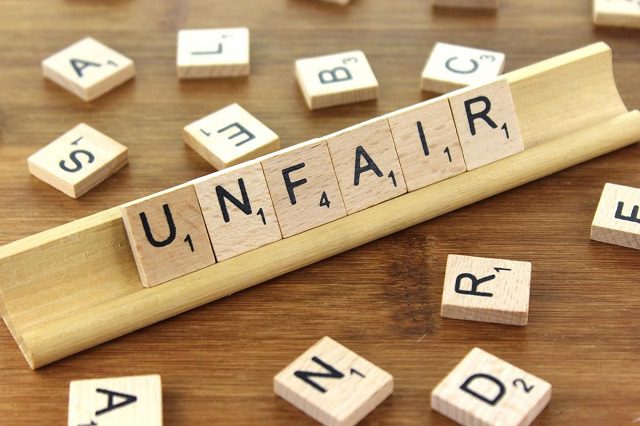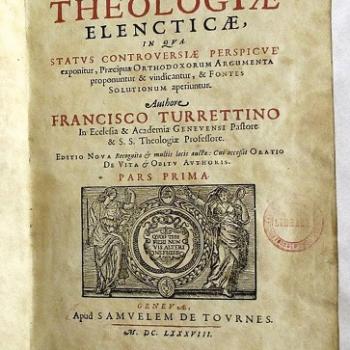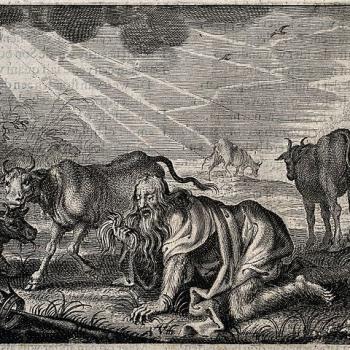
Atheist anti-theist Jonathan M. S. Pearce is the main writer on the blog, A Tippling Philosopher. His “About” page states: “Pearce is a philosopher, author, blogger, public speaker and teacher from Hampshire in the UK. He specialises in philosophy of religion, but likes to turn his hand to science, psychology, politics and anything involved in investigating reality.” His words will be in blue.
This is my fourth piece on Doubting Thomas and the issue of a supposedly “unfair” God, in response to Jonathan. I’ll be replying in the near future to several additional papers of his on the same general topic. See the previous installments:
Pearce’s Potshots #17: Doubting Thomas & an “Unfair” God [3-17-21]
Pearce’s Potshots #18: Doubting Thomas & Evidence [3-18-21]
Pearce’s Potshots #19: Doubting Thomas & a “Mean God” [3-19-21]
*****
I am responding to Jonathan’s article, What Is Fairness? Tackling Verbose Stoic’s Mission. (3-23-21). In this paper (and in the coming related ones), I will not reply to everything: as I usually try to do, as my standard methodology. Rather, I will respond if I think I have something to offer, and if Jonathan’s argument doesn’t venture into abstract philosophical territory that I find 1) boring, or 2) technically over my head.
I will not, for example, argue (at any length) the matter of human free will: which I take as entirely self-evident to everyone. Jonathan denies it, and is (far as I can tell) a hard determinist. So that false and absurd assumption underlies all of his thoughts about God. I won’t argue it. I think it’s stupid and a waste of time.
Moreover, I am defending the God as revealed in the Bible because this is the God that Christians believe in, follow, and have faith in. I can hardly defend (and have not the slightest interest in defending) that to which I am not committed. I believe in God and Christianity for a host of reasons: a matter of cumulative impact and force. I obviously can’t go through all of them here. But it’s not blind faith. It’s not without “evidence.”
Jonathan is critiquing Christianity; not mere theism (let non-Christian theists defend that if they wish; it ain’t my burden). We have to have some specifics about what God is like, and the best place for that is His purported revelation: the Holy Scripture. I will not defend its inspiration, which I accept based on many different reasons. I will assume it throughout. I am defending the biblical God. Believe in Him or not, at least that gives us objective and concrete propositions to agree or disagree with.
If Jonathan is critiquing something that he construes as “God”: with various characteristics, he must get those notions from somewhere. Many notions about God in the atheist mind are arbitrary and subjective mush; pulled out of a hat. But they also smuggle in distorted caricatures of what was once the biblical God. Occasionally they correctly understand the actual characteristics of God, obtained from the Bible.
In the absence of evidence, I wouldn’t mind communication from God as to the reasoning for this.
Precisely! Setting aside what he thinks is “evidence” and what isn’t (a whole ‘nother huge issue), it’s clear that he allows some discussion of purported revelation to enter into the discussion.
The least persuasive mechanism is some apologist on the internet telling me why God “might” do something because it is “perhaps” the case, “probably”.
Exactly! I totally agree: the least persuasive mechanism is some anti-theist atheist with an axe to grind on the Internet telling me why God “might” or might not do something because it is “perhaps” the case, “probably” or because he thinks so, (based on ?????).
So, yes, one of the fundamentals for any belief – unicorns or a fair god – is evidence. Blind faith doesn’t cut it.
I agree again. Our problem with atheist conceptions of “evidence” is that they are far too (arbitrarily) constricted. They usually presuppose that empiricism is the be-all and end-all of epistemology (untrue) and that non-empirical reasons for belief are immediately invalid (also untrue). And they presuppose a materialism that disallows God and the miraculous / supernatural from the outset.
That argument is a self-defeating one for atheists, anyway, as I have contended many times. Fideism (blind faith) is a tiny minority position in Christianity. As such, it’s not worth any further consideration.
And even if that faith is based on other components outside of the fairness debate, since I call into question all of those ancillary or unconnected claims, then just asserting God is fair based on your (as I see it, erroneous) faith is not persuasive for me.
And even if your lack of faith and hostility to faith and God is based on other components outside of the fairness debate, since I call into question all of those ancillary or unconnected claims, then just asserting God is unfair based on your (as I see it, erroneous) hostility to faith is not in the least bit persuasive for me.
I do not adhere at all to this sort of doxastic voluntarism (doxastic [pertaining to belief] voluntarism is a position whereby one believes that they have voluntary control over what they believe), as I have said elsewhere: On the Argument from Reason: Doxastic Voluntarism.
Then why bother writing such papers, if you have no control over what you believe? It’s not even you writing it. In effect, there is no “you.” It’s meaningless. You “write” something that doesn’t come from a free, uncoerced mind (centered in that brain in your head) and I’m supposed to “respond” in the same supposed way: as if that makes any sense or can explain anything? This is the sort of nonsense that led Nietzsche at length to the insane asylum. I’m sure his thoughts even then made more sense than the ludicrous slop he wrote when “sane.”
We don’t choose to believe, belief is a conclusion from a whole bunch of things going on behind the scenes.
Gotcha. You didn’t choose atheism (also a belief — far blinder than ours — and yes, a worldview too). If you “have” to be that because who knows what? causes you to be, why bother engaging in dialogue with a Christian who only is what he is because who knows what? causes them to be? The whole thing is ridiculous. You are caught in your meaningless bubble.
But since my side makes sense and is rational, I have something meaningful to actually write about (which is why I’m writing). And (ultimately) I have the joy and peace of the Gospel to offer undecided readers: a positive, fantastic, life-transforming message.
I can’t “decide” to – to make myself – believe the moon is made of cheese or merely “choose” to take on any other such position.
You can’t decide anything if you don’t have a free will and an independent mind to do so. The very idea of philosophy is an utterly useless, futile exercise in such a scenario. All your words are literally meaningless. Why can’t you see this? Get out of your bubble!
We have the following choices:
- God doesn’t exist.
- God exists but is not omni, including that God is not so interested in this belief scenario, or is a deistic god.
- God is omni, but has a greater good to consider in not allowing equality of access to God.
- We are missing something and this really is prima facie fair in some way.
I reject all four. I believe that God possesses all the “omnis” and that all human — in the final analysis — have equal access to Him: in terms of ability and opportunity to be saved. The choice is up to each individual whether he or she will follow or reject God.
Why would God, knowing that this is how my brain works, want to make it even harder for me to believe than for Dave Armstrong?
I deny that He does so. You have adopted various false and absurd beliefs and premises through the years that make it harder for you to believe in God (building a castle on sand; a house of cards), and then you irrationally blame Him (a Being whose existence you deny) for that. Makes perfect sense, doesn’t it? It’s just like atheists blaming this nonexistent / purely imagined “God” for evil [that they have a huge problem of even defining in their worldview] . . .
All I can tell you that I presently do not believe in God.
Yeah, we gathered that.
I used to but I don’t any more.
And I would have to learn about the process by which this evolution happened, to critique it and show how you adopted various false premises along the way that led you to your present abyss. I’ve never seen a deconversion story yet that didn’t contain basic errors as to what Christianity and/or God were in the first place. In other words, it is always a rejection of a straw man, not the thing itself.
I would need a lot more evidence to flip me. I am in a position whereby the rational arguments for atheism are that much stronger than for theism that evidence, for me, would need to be much, much greater (obviously and, well, evidently) than for Dave Armstrong.
I would need a lot more evidence to flip me (back to my old “practical atheism”). I am in a position whereby the rational arguments for Christianity are exponentially stronger than for atheism, so that evidence, for me, would need to be much, much greater (obviously and, well, evidently) than for Jonathan M. S. Pearce.
And yes, there will be psychological heuristics and biases and mechanisms at play here for both of us.
Of course; and many more factors as well: too many to even count.
But God should be taking this into account when apportioning me the evidence.
He takes all into account for everyone. It’s all part of the equation.
Nothing said in this has convinced me that God is fair. The only way you could do this is to:
- Argue for consequentialism (fine by me, but I am an atheist. How does that square with God?).
- Establish that there is a greater good for the unfairness.
- Persuade me of a really reasonable – probable – hypothesis of what this greater good might precisely be, and show me why it is the most probable explanation fo[r] the data. In other words, possibiliter [e]rgo probabiliter is not good enough.
#2 is true if we put “unfairness” in quotation marks: meaning that we wrongly perceive to be unfair what actually isn’t in the long run. Once the notion of an eternal heaven of bliss / perfect happiness is part of the equation, everything changes. That easily makes up for any suffering and evil we experience in this world. It’s only the atheist worldview that has insuperable difficulties, in that there is no cosmic justice and no ultimate meaning or purpose to life. Heaven is the answer here. It’s what changes the entire discussion.
This would also need to square with all the other arguments and evidence I have against the existence of (Omni-)God.
They can be shown to be erroneous . . . and then what do you do? Invent further objections?
***
Photo credit: Nick Youngson [The Blue Diamond Gallery / CC BY-SA 3.0 license]
***
Summary: Preliminary reply to several aspects of this topic of the “unfair meanie God”. I also tackle the crucial question of whether human beings have a free will, or are merely programmed robots.

















